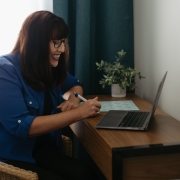Shrinking
In this episode of the SOS Podcast, hosts Megan and Rob discuss the TV show “Shrinking,” which follows therapists as they navigate their own personal traumas and questionable boundaries with clients. Megan finds the show cringe-worthy but also humorous, while Rob is energized and motivated by the show’s portrayal of therapists working through their own issues. Overall, the hosts have an engaging conversation about the complexities of therapy and the importance of setting healthy boundaries.
What not to do as a therapist.
Therapists must be extremely careful not to tell their clients what to do. This is a boundary that must be respected in order to maintain the therapeutic relationship and ensure the client is receiving the best care possible. Unfortunately, this boundary is often crossed in the popular TV show Shrinking, where the main characters are therapists who sometimes tell their clients what to do, rather than allowing them to form their own conclusions and make their own decisions.
It is important to remember that the therapist is there to provide support and guidance, not to dictate how the client could live their life. A therapist could never use their power or authority to pressure a client into a certain decision or action. Instead, they could listen to the client and help them to explore their options and find the best solution for them. The client could be the one who ultimately makes the decisions about their life and how they want to move forward.
In Shrinking, the main characters often cross this boundary and tell their clients what to do, which can be damaging to the therapeutic relationship. This is especially true when the therapist is trying to help the client leave a toxic relationship or situation. In this case, the therapist could be careful to allow the client to make the decision for themselves and not pressure them into a certain action.
In addition to respecting the client’s autonomy, therapists could also be aware of the potential for dual relationships to form. This is when a therapist and client become involved in a relationship outside of the therapeutic setting, such as a friendship or romantic relationship. This can be dangerous as it can blur the boundaries of the therapeutic relationship and can lead to a conflict of interest.
In conclusion, it is important for therapists to remember not to tell their clients what to do and to respect their autonomy. They could also be aware of the potential for dual relationships to form and take steps to avoid them. By following these guidelines, therapists can ensure that their clients receive the best care possible and that the therapeutic relationship is maintained.
Set healthy boundaries in therapy.
Therapy is a powerful tool that can help people work through difficult issues and gain insight into their lives. However, it is important to remember that it is a professional relationship and that it is important to set healthy boundaries. This is especially true when it comes to telling clients what to do.
Therapists could not be telling their clients what to do or what decisions to make. It is important to remember that the client is in control of their own life and they could be allowed to make their own decisions. Instead, therapists could focus on providing their clients with the information they need to make informed decisions. They could also be aware of the potential for dual relationships to form and take steps to avoid them.
Therapists could also be mindful of the potential for their clients to become too attached to them. While it is natural for clients to become attached to their therapist, it is important to remember that the relationship is professional and could remain that way. Therapists could be aware of the signs of an unhealthy attachment and take steps to ensure that the client does not become too attached.
Finally, it is important to remember that the therapeutic relationship is based on trust. Therapists could strive to maintain this trust by being honest and open with their clients. They could also be aware of their own emotions and take steps to ensure that they are not projecting their own feelings onto their clients.
Setting healthy boundaries in therapy is essential to ensure that the therapeutic relationship remains professional and that the client receives the best care possible. Therapists could be aware of the potential for dual relationships to form and take steps to avoid them. They could also be mindful of the potential for their clients to become too attached to them and strive to maintain the trust between them. By following these guidelines, therapists can ensure that their clients receive the best care possible and that the therapeutic relationship is maintained.
Maintain healthy boundaries.
Boundaries are the guidelines that therapists use to maintain a professional, therapeutic relationship. They are essential to ensure that the client is receiving the best possible care. Boundaries could be established early on in the therapeutic relationship and could be discussed with the client. These boundaries could include the topics that will be discussed in therapy, the amount of contact between sessions, and the expectations of the therapist.
Boundaries could also be established to prevent dual relationships from forming. Dual relationships can occur when a therapist and a client become too close or when the therapist begins to treat a client like a friend. This can be damaging to the client and can lead to a breakdown in the therapeutic relationship. To prevent this, therapists could make sure that they maintain a professional relationship with their clients and that they do not share personal information or engage in activities outside of the therapy session.
Therapists could also be aware of the potential for their clients to become too attached to them. This can be a difficult situation for both the client and the therapist, as it can lead to feelings of guilt or confusion. To prevent this, therapists could strive to maintain a trusting relationship with their clients. They could also be aware of their own boundaries and be prepared to set limits when needed.
In conclusion, setting healthy boundaries in therapy is essential to ensure that the therapeutic relationship remains professional and that the client receives the best care possible. Therapists could be aware of the potential for dual relationships to form and take steps to avoid them. They could also be mindful of the potential for their clients to become too attached to them and strive to maintain the trust between them. By following these guidelines, therapists can ensure that their clients receive the best care possible and that the therapeutic relationship is maintained.
Mindfulness aids mental health.
Mindfulness has become an increasingly popular tool for helping people to manage their mental health. Mindfulness is a form of meditation that focuses on being present at the moment and paying attention to one’s thoughts and feelings without judgment. It has been found to be effective in treating a variety of mental health issues, including anxiety, depression, and stress.
Mindfulness is beneficial for mental health in a number of ways:
- First, it helps people to become more aware of their thoughts and feelings. This increased awareness can help people to identify patterns in their thoughts and feelings that may be contributing to their mental health issues. For example, if someone is feeling anxious, they may be able to recognize that they are ruminating on negative thoughts and feelings. This awareness can help them to take steps to address the underlying issue.
- Second, mindfulness can help to reduce stress. When people are mindful, they are less likely to become overwhelmed by their thoughts and feelings. Instead, they can observe them without judgment and take steps to reduce their stress levels. This can be done through activities such as deep breathing, progressive muscle relaxation, and guided imagery.
- Third, mindfulness can help to increase self-compassion. People who practice mindfulness are more likely to be kinder and more understanding of themselves. This can help them to be more accepting of their own mistakes and to be less critical of themselves. This can be especially beneficial for those who struggle with low self-esteem or perfectionism.
- Finally, mindfulness can help to improve the quality of relationships. People who practice mindfulness are better able to be present in their relationships and to be more understanding of their partner’s feelings. This can lead to more meaningful and fulfilling relationships.
Overall, mindfulness can be a powerful tool for improving mental health. It can help people to become more aware of their thoughts and feelings, reduce stress, increase self-compassion, and improve their relationships. For these reasons, mindfulness is an important tool for mental health professionals and those seeking to improve their mental health.
Ways to practice mindfulness.
- One way to practice mindfulness is to focus on the present moment. This can be done by focusing on the breath, observing thoughts without judgment, and being mindful of one’s physical sensations. By focusing on the present moment, we can become more aware of our thoughts and feelings, which can help us to better understand ourselves and our reactions to certain situations. This can also help us to become more aware of how we interact with others and how our behavior impacts our relationships.
- Mindfulness can also be used to expand our perspective on certain issues. This can be done by questioning our assumptions and looking at situations from different angles. By doing this, we can open ourselves up to new possibilities and gain a better understanding of the situation. This can help us to make more informed decisions and find solutions that we may have overlooked before.
- Lastly, mindfulness can be used to cultivate self-compassion. This can be done by recognizing our own pain and suffering and offering ourselves kindness and understanding. By doing this, we can learn to accept ourselves and our flaws, rather than judging ourselves harshly. This can help us to become more resilient in the face of difficult emotions and better able to cope with challenging situations.
Overall, mindfulness can be a powerful tool for improving mental health. It can help us to become more aware of our thoughts and feelings, expand our perspective on certain issues, and cultivate self-compassion. By practicing mindfulness, we can gain a better understanding of ourselves and our relationships, and find ways to better cope with difficult emotions and challenging situations.
Expand your compassion.
Einstein famously said, “A human being is a part of the whole called by us universe, a part limited in time and space. We experience ourselves, our thoughts and feelings as something separated from the rest, a kind of optical delusion of our consciousness.” This quote speaks to the idea of expanding our compassion to include all living creatures and the whole of nature in its beauty. When we are so caught up in our own narrow view of ourselves and what is best for us, we can easily forget the interconnectedness of all things.
Mindfulness can help us to expand our compassion in a number of ways. Firstly, it can help us to become more aware of our own thoughts and feelings, which can lead to greater understanding and empathy for others. Mindfulness can also help us to become more aware of our own biases and prejudices, and to recognize and challenge them. Finally, mindfulness can help us to recognize the interconnectedness of all things and to cultivate compassion for all living creatures.
To cultivate greater compassion, we can practice mindfulness through conflict. This means recognizing and accepting our own emotions and those of others and using them as a tool to become more mindful. We can also use mindfulness to become more open and compassionate towards those with whom we may disagree. Finally, we can use mindfulness to create a safe space to explore different perspectives and to become more mindful of our own beliefs and values.
By expanding our compassion, we can create a more peaceful and compassionate world. Through mindfulness, we can become more aware of our own thoughts and feelings, recognize our biases and prejudices, and cultivate understanding and empathy for others. We can also use mindfulness to become more open and compassionate towards those with whom we may disagree and to create a safe space to explore different perspectives. By expanding our compassion, we can create a more peaceful and compassionate world.
Trust your instincts.
Trusting your instincts is an important concept to remember in life. We all have a natural intuition that can help guide us in the right direction. By trusting our instincts, we can make decisions that are in our best interest and that will lead us to a more positive outcome.
However, it is important to remember that our intuition could not be the only factor in making decisions. We could also consider our own code of ethics and morals, as well as the opinions of those around us. It is important to be mindful of our own biases and prejudices and to be open to different perspectives. We could also be aware of our own limitations and be willing to seek advice and help from others when necessary.
Trusting your instincts is an important concept in life, but it could be balanced with other considerations. By being mindful of our own biases and prejudices, and by being open to different perspectives, we can make decisions that are in our best interest and that will lead us to a more positive outcome.











